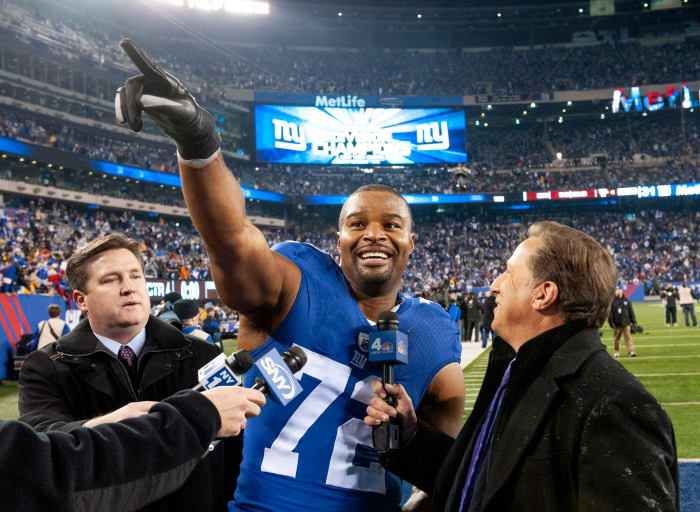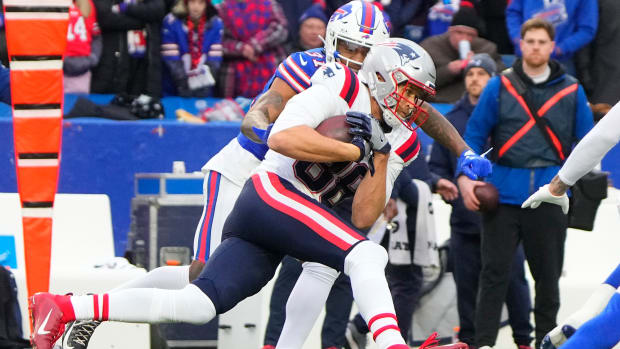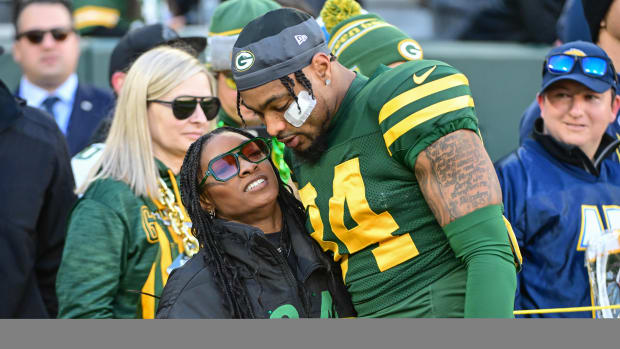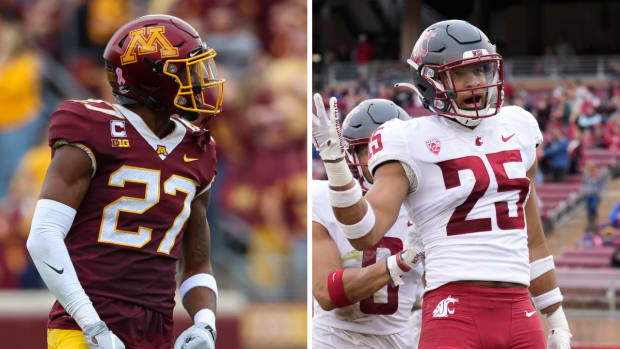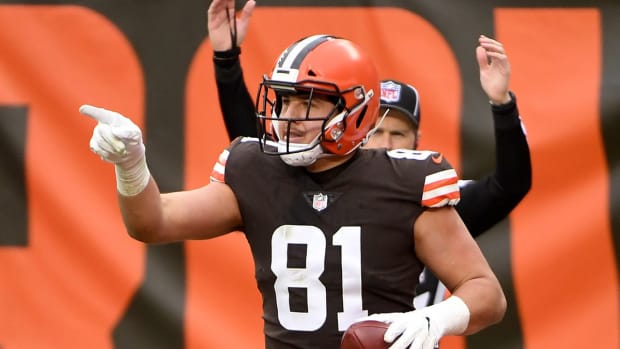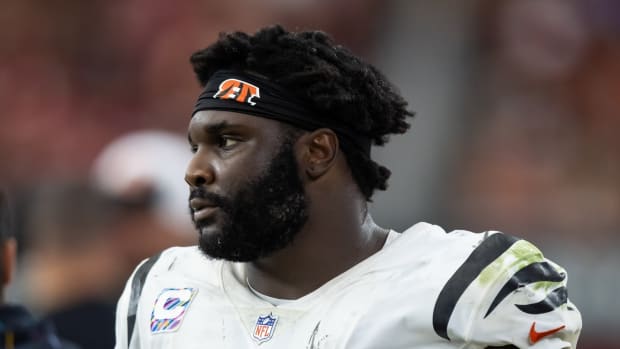How Osi Umenyiora Is Finding NFL Players in Africa
Osi Umenyiora first got to know Roger Goodell in 2008, as part of a small NFL envoy that embarked on a seven-day USO tour to military bases throughout Afghanistan and Iraq. “We became pretty good friends,” the retired Giants edge rusher says of the commissioner. “So when the idea came to my head, I just went straight to him with it and took my shot.”
The results of that ensuing conversation, which took place about a year ago, will be realized this week when the NFL kicks off its first official events in Africa, staging a prospect camp, a “fan zone” and a flag football clinic in Ghana’s capital, Accra. Six other players of African descent are slated to join Umenyiora, including Browns linebacker Jeremiah Owusu-Koramoah (Ghana) and Colts end Kwity Paye (Liberia). But none were as instrumental in making it happen as the Giants great, who was born in London to Nigerian parents, later won two Super Bowl rings in New York and now finds purpose in planting football’s seeds where his personal roots lie.
“It’s a big deal for several reasons,” Umenyiora says. “There are 100-plus players in the NFL who were born in Africa, or are first-generation [African American], and all of them want to do something back home. Then we know in Africa, you have some of the best athletes, and we’re not giving them the opportunity to showcase that talent to make better lives for themselves.
“We also know the demand for that type of talent is in America, and we know the supply is in Africa, so it’s a matter of connecting the two. We believe the future of the NFL is in Africa.”
Before joining forces with the league, Umenyiora set out on this mission all but solo, teaming up with former professional basketball player Ejike Ugboaja to found a football program called The Uprise that has put on half a dozen talent identification camps across the continent since early 2021. Three players who attended one of these tryouts, held in Abuja, Nigeria, recently signed NFL contracts, with the Cardinals (offensive lineman Haggai Chisom Ndubuisi), Chiefs (tight end Kehinde Hassan Oginni) and Giants (offensive tackle Chigbo Roy Mbaeteka).
Speaking on the phone from London before flying to Accra, the 40-year-old Umenyiora discussed how his grassroots efforts originated, what he envisions for their future, which active edge rushers he enjoys watching, and more.
Sports Illustrated: How did you get to this point, where you’re the one leading the charge to grow the sport in Africa?
Osi Umenyiora: It started a long time ago. I lived in Nigeria for a time, and over the years, I noticed there were a bunch more African people in the NFL than when I started. And I also noticed that nobody was really saying anything about that. And I knew from talking to them that they all wanted to do something back home, but they didn’t know what to do.
Last few years I’ve been doing some charity in Africa, whether that’s digging wells or giving scholarships or electricity, things of that nature. But it never seems to be enough. As I realized everything that was going on, I said, “Wait a minute, why not give people the opportunity to help themselves?” I think that’s really where the idea was born.
SI: So you just called up Roger Goodell?
OU: I don’t call him like that. Only when it’s really important, I’ll send him a message.
SI: What was your pitch?
OU: It really wasn’t much of a pitch. It was more, “Listen sir, you have all these first-generation or born-in-Africa players on NFL rosters right now, and if you look at what’s going on in the colleges, there’s probably going to be 150 in the next two years. So you’re looking at roughly 10% of your workforce who have ties to this region of the world that’s developing, that has innumerable amounts of natural talents, a young population, all these things going in their favor over there, and nobody [in football is] really looking at that part of the world.
SI: So you talk to him. What happens next? How do you get this off the ground?
OU: Now it’s about who’s going to help me put the plan together? Luckily we had a lot of people from the NFL International side who’ve worked in tandem with myself to put this plan together. I took a trip out to Rwanda to witness the BAL [Basketball Africa League], had some real serious talks with NBA people about what they did, how they’ve been doing it for so long. I took on all that information and brought that back with me and kept on talking it through. Eventually we came up with a plan that we think in the short- and long-term makes it viable.
SI: What makes it viable in the short and long term?
OU: We found three in Nigeria, guys who haven’t played organized football before, and brought them over. They did the [International Pathway Program] combine, went to train in Arizona and now all three are on NFL teams. When you do that, you see the level of talent that exists over there. And that’s just the tip of the iceberg. There’s so many players like that, and when you have that amount of players, how could it not work long-term?
SI: When did you start to feel validated in your mission?
OU: I didn’t feel validated until the scouts saw the players, the general managers saw the players, and liked them and signed them. That’s when I really felt validated. No one really believed something like that was possible, but I believed it was possible. Seeing how quickly they took on information in Arizona, they were getting better in a couple days at things that would take people a couple months.
SI: When you say, “No one really believed something like that was possible,” how would you define what “that” is?
OU: Think about this: Someone pitches you a movie where three guys were on the streets of Nigeria last year, a couple didn’t know where their next meal would come from and in a couple months’ time they’re actually in the NFL with guaranteed money in their pocket. You’d say it was ludicrous, right? How could something like that happen? Who would believe that?
SI: What was that like for you, when it happened?
OU: Incredibly emotional. Just so much hard work went into it. There’s no mechanism for identifying athletes in Africa like there are in the Western world. A lot of them aren’t in school. You know they’re there, but how do you go about finding them? When it culminates in the way it did, it being our first time ever attempting it, there was nothing like it.
Having the ability to give people the opportunity I was given, to put people in the situation I was in, and all the benefits that come from that, is something you don’t see every day. But here we do have that opportunity. We have a bunch of African players in the NFL right now—not only African players, but Black Americans—who are looking for ways to help, and they don’t really know what to do. Well, here’s your opportunity.
There’s a massive demand for athletes in America. You’ve got NIL going on, all kinds of stuff that’s just going to continue to drive up the demand for five-star athletes. What you have in Africa is an untapped resource of people looking for the opportunity to come over here and better themselves. It’s all about making that connection, and for the life of me I don’t understand why no one has fought to do that before properly.
SI: What memories do you have from living in Nigeria as a kid [from ages 7 to 14]?
OU: It really was a great time for me. I was lucky in the sense that my father was well-off, so we lived a good life, went to the best schools. But I also remember that America was the shining light. That was the place that we all knew. If we’re able to make it there, we could get those opportunities. Even though we came from upper-class living, we understood the opportunities for us in America were still better than what we were going to be able to do in our home country of Nigeria. My father recognized that also, and he had the wherewithal to send us to America.
SI: How would your life have been different if programs like this had existed back then?
OU: I think there would probably be 300 to 400 players of African descent in the NFL, if something like that existed when I was a kid, and I think the game would be a lot more popular in Africa than it is now. People just don’t understand it. It’s such a spectacular game. The drama, everything that unfolds out there on that field, I think is something that needs to be witnessed.
America has been really selfish with this game. They try to keep it to themselves. But I think the whole world needs to see it.
SI: Do you think that selfishness prohibits outreach efforts and stunts growth?
OU: I think there’s some of that, but from studying economics that’s the wrong way to look at things. By raising the talent level you’re going to increase your revenue and do more with the sport. Everyone eats better that way. If you can get a bunch of talent coming in from one place, why would you deny that?
SI: What are your dreams for the future of the NFL in Africa? How do you build this out from here?
OU: Long-term, I believe that if you go into any house, any bar, any restaurant in Africa, you’re going to be seeing NFL games in 10 years, all over the screens. That’s what I want. I want there to be more players, more African players in the NFL, in high schools, in colleges, I want more people to be given more opportunities. Then on top fo that, hopefully we’ll have academies there or training camps there or be able to play a preseason game there. Maybe the Pro Bowl.
SI: Ghana’s vice president [Mahamudu Bawumia] recently lobbied for the NFL to establish a football academy there. What about something like that?
OU: Actual academies? Something we’ve discussed. The only problem with that would be: Who would they play? And then the travel for them to be able to play. I’m thinking more along the lines of training centers, where we actually find all the best athletes to train them, give them a baseline understanding of football and open them up for the world to see.
SI: How about a regular-season game in Africa?
OU: Oof, probably about 20 years away. But it could happen. If we build up the fan base enough, we won’t have a choice but to do something there.
SI: How often do you watch the NFL these days?
OU: A lot. All the time. I’ve done television here in the U.K. for a couple of years now, so I have to follow it intensely. The game just seems like it’s gotten better.
SI: Better how?
OU: I think the competition. Even if you look at last year, every game, in the playoffs, the story lines, everything is just … I don’t know how much better it can get. Cincinnati in the Super Bowl? We all know what Cincinnati’s been, and now—boom—here they are. All these teams, all these new QBs coming in, it’s in a fantastic place.
SI: Which edge rushers do you enjoy watching?
OU: Joey and Nick Bosa, both of those guys. Von Miller, he’s been my favorite for a long time. Maxx Crosby is coming along. Odafe Oweh, Yannick Ngakoue, Emmanuel Ogbah, Romeo Okwara are really good players. Chandler Jones, really enjoy watching him.
SI: Do you miss it?
OU: I don’t miss playing. I miss the camaraderie, the locker room. I played 12 seasons.
SI: What would make this week’s events a success?
OU: I think by every single metric, it’s already a success. The fact that it’s happening is a success. The fan zone they’re having, they invited a couple thousand people, that sold out almost immediately. I know the level of athletes we have, coming from the camps we’ve had, will be a very high level.
Then just the African players like Jeremiah, Kwity, to teach and be in that environment; African players now are different than they were before. They have a real sense of pride that I didn’t have. We were made fun of when I first got to America, people saying all kinds of stuff. But these guys are so different. They’re proud. They wave that flag. So we’re continuing to give them something to be proud of.
More NFL coverage:
• Daniel Snyder’s Latest Act of Cowardice
• The Ravens Are Fleecing the NFL Again
• Sources: Browns Willing to Pay Half of Mayfield’s Salary for Trade
• Six Turnaround Candidates to Make the Playoffs


































